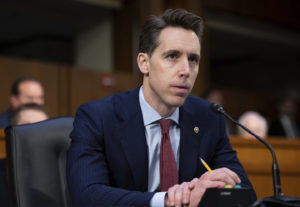St. Louis Children’s Hospital stops prescribing puberty blockers and hormone treatments to minors in compliance with new Missouri law
Washington University officials announced Monday their doctors will no longer prescribe puberty blockers or hormone treatments to minors through its Transgender Center at St. Louis Children’s…

Washington University officials announced Monday their doctors will no longer prescribe puberty blockers or hormone treatments to minors through its Transgender Center at St. Louis Children’s Hospital.
The decision was made in response to Missouri’s Save Adolescents From Experimentation (SAFE) Act, which went into effect Aug. 28. The new law bans the prescription of gender-altering hormones and puberty blocking drugs to anyone under the age 18. It also bans transgender surgeries on minors.
While there is a grandfather clause in the law for minors who were receiving such medications prior to Aug. 28, officials at Washington University decided to stop the dangerous practice altogether due to legal concerns.
“Washington University physicians will no longer prescribe puberty blockers or cross-sex hormones to minors for purposes of gender transition,” a statement from university officials reads. “We are disheartened to have to take this step. However, Missouri’s newly enacted law regarding transgender care has created a new legal claim for patients who received these medications as minors.”
The provision creates “unsustainable liability,” university officials concluded, referring to how the law allows minors treated with the experimental medicine after Aug. 28 to sue up to 15 years after turning 21, or 15 years after the patient ceases “treatment of the injury at issue,” whichever is later.
The new law came on the heels of an investigation initiated by Missouri Sen. Josh Hawley’s office earlier this year, after a former employee of the Transgender Center came forward with shocking allegations.
In February, Jamie Reed, a former case manager at the Washington University Transgender Center, blew the whistle on its “lack of formal protocols,” resulting in treatment which she says was “permanently harming the vulnerable patients in [the clinic’s] care.”
“To begin transitioning, the girls needed a letter of support from a therapist—usually one we recommended—who they had to see only once or twice for the green light,” she said. “To make it more efficient for the therapists, we offered them a template for how to write a letter in support of transition. The next stop was a single visit to the endocrinologist for a testosterone prescription. That’s all it took.”
Hawley applauded the University’s decision when it was announced this week, but also said university officials were not cooperating with his office’s investigation.
“Good news for parents and children, and basic common sense,” the senator said on X, formerly known as Twitter. “But we still need answers about what happened at WashU, and why university officials won’t cooperate with investigators.”
Missouri Attorney General Andrew Bailey also applauded the decision.
“[This is a] big win for Missouri’s kids and a step in the right direction to properly addressing gender dysphoria and taking woke ideology out of health care,” he wrote on X.
Reed agreed, saying the university had made a “difficult, but nonetheless right decision” which curtails “the impacts and harm these drugs have on minor children, coupled with the recently affirmed new state law.”
Opponents of the new legislation lamented the university’s decision as harmful.
“I hope that they’re very pleased with the harm that they’re doing to transgender children,” said Kim Hutton, whose son had been treated at the clinic. “Obviously our children are not worthy of care.”
St. Louis Children’s now becomes the second major provider in the state to end the practice as a result of the new law.
Last month, University of Missouri Health Care similarly announced it would stop prescribing puberty blockers and “gender-affirming” hormones to minors, regardless of whether a minor patient could be “grandfathered” for having received such care previously.
“Health care providers face significant legal liability for prescribing or administering cross-sex hormones or puberty-blocking drugs to existing minor patients under the new cause of action,” MU Health Care spokesperson Eric Maze said. “MU Health Care providers may continue to provide other types of gender-affirming care that is not impacted by the law.”
Even still, not all major child healthcare providers in the state are going as far in response to the new law.
Children’s Mercy Hospital in Kansas City told local NBC affiliate KSHB 41 the hospital is in compliance with the new law. However, it stopped short of saying it would cease all prescriptions for the experimental drugs, implying it would continue to treat minor patients who qualify under the legislation’s grandfather clause.
The hospital’s statement reportedly came in response to a letter AG Bailey sent to the hospital demanding compliance with the SAFE Act.
“I remind you, too, that any health care provider or entity who knowingly violates the SAFE Act is engaging in professional misconduct as a matter of law and ‘shall have his or her license to practice revoked,’” his letter warns.
“Children’s Mercy is complying with the new law,” the hospital wrote in response. “The care, privacy, and wellbeing of the patients we serve remains our top priority. We acknowledge receipt of the letter published by the Attorney General.”



